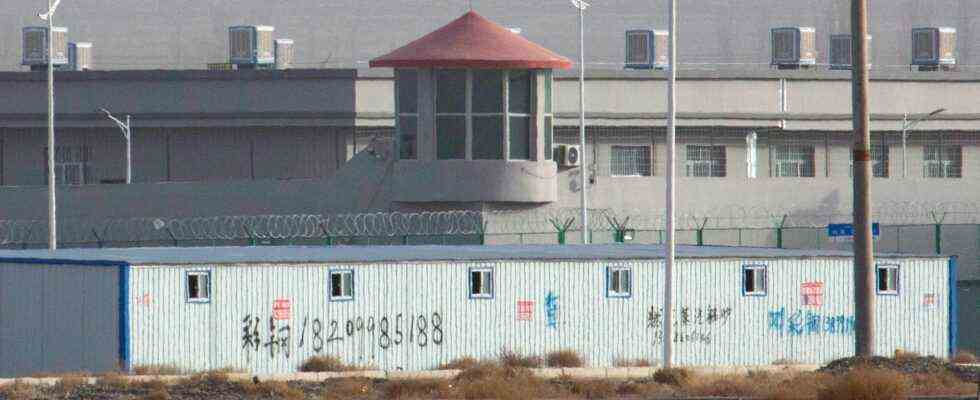Exclusive
Status: 05.09.2021 7:04 p.m.
Human rights activists have reported responsible employees of German companies because they are said to have profited from crimes against Uyghurs in China. Report Mainz and the SZ has the ad exclusively.
Systematic surveillance, mistreatment and forced labor – more and more details have come to light over the past few years on how the Chinese government is suppressing the Muslim Uyghur minority.
At least one million people are said to be held in re-education camps in the Xinjiang region, where they will be brought into line culturally and politically. Thousands of people from rural regions are supposed to be forced to work through state-organized work programs, for example in yarn or textile factories.
Report to the Attorney General
To this day, a substantial part of the cotton processed worldwide comes from Xinjiang. With a view to the situation in China, human rights organizations therefore also see a responsibility in the global textile industry, possibly even a criminal one.
Therefore, the Berlin “European Center for Constitutional and Human Rights” (ECCHR) has filed a complaint with the Attorney General. It affects five large German corporations, including the discounter Lidl, and is directed against responsible employees. To the ARD political magazine Report Mainz and the “Süddeutsche Zeitung” (SZ) has the advertisement exclusively.
On about 100 pages, the human rights activists try to substantiate the charge that responsible employees of the five companies have made themselves suspected of complicity in a crime against humanity of slavery. In recent years, the companies have had direct or indirect supply relationships with textile companies in Xinjiang, for which there are indications of the use of forced labor.
No evidence, but suspicion
China scientist Björn Alpermann, who has been researching the situation in Xinjiang at the University of Würzburg for years, has analyzed the ad. He also assumes that Uyghurs often have to work under duress – for example when they are placed in jobs after imprisonment in re-education camps.
“The well-documented human rights violations in the context of the mass arrests since spring 2017 do not allow any other conclusion than that the dismissed do not enter into employment voluntarily,” Alpermann told Report Mainz. He also considers it plausible that Uyghurs from rural regions will be pressured into jobs.
However, it is extremely difficult to prove this compulsion for individual supplier companies, as the advertisers are trying to do. Because the local situation does not allow human rights activists or journalists to research freely. Current eyewitness reports are rare. That is why the expert does not dare to make a clear assessment of the ad. “In none of the cases reported I can find crystal-clear evidence of forced labor,” but there are “many suspicious factors that should be investigated,” said Alpermann.
Supplier lists show connection to Xinjiang
The ad is directed against Lidl, among others. Supplier lists show that Lidl had supply relationships with two companies in Xinjiang. According to the report, both suppliers are suspected of having employed former inmates or “graduates” from re-education camps.
The human rights defenders refer, among other things, to Chinese government documents. These showed that one of Lidl’s suppliers employed 119 “school leavers who have not yet found a job”. This may mean “a euphemistic name for former inmates of camps,” says China expert Alpermann.
For Lidl’s second supplier, he only sees evidence in the advertisement that it has participated in the employment of “rural surplus workers”. This is how the Chinese government describes Uyghurs from rural regions who are to be placed in jobs as part of work programs. How much coercion actually prevails at both companies is worth investigating, according to Alpermann.
Companies distance themselves
Upon request from Report Mainz and SZ informed Lidl that they take the advice very seriously and expressly condemn the practices mentioned. Lidl is “continuously and systematically examining potential risks such as human rights violations in the supply chains” and “taking remedial measures if necessary”.
The two suppliers have not been working with the two suppliers for “over a year” or since “the end of June”. The other four companies also reject the allegations or distance themselves from forced labor in their supply chains. Some point out that relationships with suppliers named in the ad have already ended.
“Forced labor is not a moral problem”
It is unclear how many German companies have left traces in the Uyghur province in recent years. Because not all publish their supplier lists like Lidl and the four other companies affected by the advertisement. This is the only reason why they have come into the focus of ECCHR human rights activists.
But they are expressly not only interested in these corporations. “Of course, we are primarily not aiming to convict individual managers,” says Miriam Saage-Maaß from ECCHR. The five companies are representative of a huge industry. “We assume that many more companies have produced or sourced cotton in the region in recent years.” They all have to recognize that forced labor is not just a moral issue, but that it may be about the most serious of crimes. “The companies have to question the extent to which they contribute,” says Saage-Maaß.
It is precisely this question that independent investigators from Germany are now supposed to investigate through the complaint, according to the aim of the human rights activists. Because they do not hope that the situation in China will be clarified. “We don’t need to believe that the Chinese government will come to terms with something or change it.”
A letter from the Chinese embassy in Berlin to Report Mainz and SZ seems to confirm this expectation. It is said that there are no re-education camps or forced labor in Xinjiang. The allegations are made out of thin air and politically motivated.

